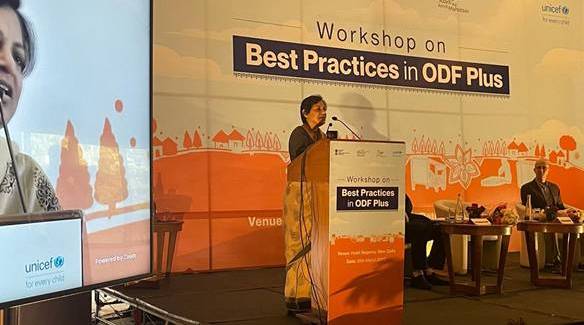Department of Drinking Water & Sanitation Organises Workshop on ODF Plus

To facilitate knowledge sharing of best practices on all verticals of ODF Plus among districts and states across the country, the Department of Drinking Water and Sanitation (DDWS), Ministry of Jal Shakti organised a one-day workshop for officials implementing Phase II of Swachh Bharat Mission Grameen (SBM-G) in rural India.The collaborative learning event organised with the support of UNICEF was held against the backdrop of over 50,000 villages countrywide declaring themselves as ODF Plus as on March 25, 2022; after ensuring sustainability of ODF status and visual cleanliness of villages by putting in places systems to effectively manage solid and liquid waste.
Chaired by the Secretary, DDWS, Smt. Vini Mahajan in the presence of Additional Secretary and Mission Director – DDWS, Shri Arun Baroka, the event will determine the capacity building initiatives that are required to accelerate implementation of activities across various verticals of ODF Plus, namely Biodegradable waste management, Plastic waste management, Greywater management, Faecal sludge management,
Gobardhan, Menstrual Hygiene Management and IEC and capacity building.Nearly 200 participants from States and Union Territories were present at the event that saw the presence of senior officials from the States such as Additional Chief Secretaries, Principal Secretaries, Mission Directors, State coordinators, State SBM-G Capacity Building Focal Points and Sarpanches who shared details of their exemplary work in the context of their villages.
In her inaugural address, Secretary, DDWS Smt. Vini Mahajan reiterated the pivotal role of global, national, regional and local knowledge-sharing activities to achieve the objectives of ODF Plus. “We believe that ensuring sanitation is critically important for the health and well-being of the people in rural India and for their future generations,” she said.
While emphasising the importance of addressing the current gaps and sustaining ODF status, she said the SBM-G campaign presents a unique opportunity to meet the aspirations of the rural community. “Let’s all work together and share the best practices in ODF Plus so that others may follow the path and make things happen. We have the understanding, the financial resources and the technical strength to achieve this. Let’s make the coming financial year the action year.”
Providing a Global perspective on Safe Sanitation and SDG 6, Mr. Nicolas Osbert, Chief-WASH, UNICEF India talked about how India has emerged as a leader in global sanitation efforts. “Achieving ODF Plus presents outstanding opportunities – the budgets made available by the government, expert partners across the board, convergence with JJM and cross-sectoral convergence,” he said.
He elaborated the impacts of ODF on rural India, current status of ODF Plus and future opportunities. “India is exporting its expertise on sanitation across the globe now. Let’s collectively work towards achieving ODF Plus. I believe that this workshop on Best Practices in ODF Plus will go a long way in operationalizing the SBM-G, Phase II.
Shri Arun Baroka AS and MD, DDWS highlighting the mission priorities of SBM-G talked about laying out a roadmap for the implementation of ODF Plus activities and prioritizing the two lakh plus villages that can achieve the ODF Plus status with minimal interventions. He said “We need to ensure that all GPs undertake plastic waste management. To show solidarity towards the same, village pradhans can pledge to shun the use of single use plastic”. He appealed to the gathering to ensure enough awareness about ODF Plus and make activities like SLWM and PWM more attractive and achievable for villages. He also stressed the need to get into an action mode.
Shri Baroka also called for the popularisation of the idea of ODF Plus. A Jan Andolan led to the success of Phase I of the campaign and we need to replicate the same to achieve ODF Plus. All our resources should be rolled towards achieving the same.
The day-long programme consisted of technical sessions and panel discussions on each of the ODF Plus verticals that are essential to complete the journey of districts from ODF to ODF Plus. The speakers included Subject Experts: Shri VK Madhavan, CEO/WaterAid India; Shri Sujoy Mojumdar UNICEF; Dr. Abhinav Akhilesh, KPMG; and Ms. ArundatiMurlidharan; and Mr. Anand Shekhar, Team Leader, SBM-G; as well as State Representatives: Shri Akashdeep, MD Assam; Mr. Abraham Thomas Renjith, Program Officer-Suchitwa Mission, Kerala; Ms. Jaspreet Talwar, Principal Secretary-Punjab; Mr. M.W. Kharkongor, Chief Project Manager, Meghalaya; Mr. Parmeswaran B, Mission Director-Odisha; Mr. L K Atheeq, ACS-Karnataka; Mr. Praveen P Nair, Director-RD&PR Tamil Nadu; Dr. P. Sampath, Mission Director, Andhra Pradesh; Dr. Neha Arora, Mission Director-Jharkhand and Ms. Padma Angmo, JKAS District Panchayat Officer; Shri Anuj Jha, Mission Director-Uttar Pradesh; Shri Sarath Kumar, Mission Director-Telangana; Shri AkshayBudania, Special Commissioner-SBMG, Gujarat and Mr. Rupesh Rathore, State Co-ordinator-Chhattisgarh.
The Government of India, in February 2020, approved Phase-II of the SBM (G) with a total outlay of Rs. 1,40,881 crores to focus on the sustainability of Open Defecation Free (ODF) status and Solid and Liquid Waste Management (SLWM). SBM (G) Phase-II is planned to be a unique model of convergence between different verticals of financing and various schemes of Central and State Governments.
SBM (G) Phase-II has been uniquely designed to leverage the capacity of individuals and communities in rural India to create a people’s movement to ensure that the ODF status of rural areas is sustained, people continue to practice safe hygienic behaviour and that all villages have solid and liquid waste management arrangements.
To ensure effective and expedited implementation of SBM-G – the largest behaviour change programme in the world, continuous engagement and capacity strengthening of all stakeholders at various levels is required. In order to facilitate this, DDWS has developed a range of reference materials pertaining to the programme’s approach with technical specifications, cost estimates, technical drawings, etc. for various elements of ODF Plus. Among them are brochures and toolkits on each of the ODF Plus verticals that would serve to build capacities of field staff and functionaries.
In this phase too, the campaign effectively utilizes modern technology for comprehensive monitoring. Each SLWM unit in every village is being mapped on Integrated Management Information System (IMIS) for a real time progress report. Every facility is being geotagged for ensuring transparency in the entire process. This way, the SBMG dashboard has become a symbol of action and progress.
The impact of SBM-G Phase II will be seen in improvement in public health, economic benefits and the promotion of entrepreneurship.

